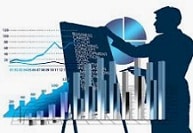To understand the notion of economic policy , the first thing we must do is pay attention to the first term of the expression. It can be said that politics is the doctrine linked to the government of a State and the activity carried out by the person who has the responsibility of managing public affairs .
 The adjective economic , meanwhile, refers to that related to the economy : the science that is dedicated to analyzing how to use resources that are scarce to satisfy the needs of human beings.
The adjective economic , meanwhile, refers to that related to the economy : the science that is dedicated to analyzing how to use resources that are scarce to satisfy the needs of human beings.
If it is interesting to know the separate meaning of the two words that give shape to the term economic policy, it is also interesting to discover its etymological origin.
Politics, first of all, derives from Greek. Specifically, it emanates from the expression "politiké techne", which can be translated as "social art" or "the art of the things of the State."
Economic, secondly, also comes from Greek. In its case, it means "relating to finances " and is the result of the addition of the noun "oikos", which is synonymous with "house"; from the word "nomos", which is the same as "law", and from the suffix "-ikos", which means "relative to".
These ideas allow us to focus on the concept of economic policy. This is the name given to the set of plans, programs and strategies of a government to intervene in the economy of a region or a country.
It is generally understood that economic policy should be aimed at promoting sustainable economic development that allows the generation of wealth . In this framework, there are measures that are taken to generate short-term effects (and thus address current problems) and others that pursue long-term results.
Through economic policy, rulers can encourage the creation of jobs and control inflation , to mention two possibilities. It is important to mention that, as part of economic policy, various fields of action appear.
Thus, within what economic policy is, we find the so-called financial or monetary policy. We can establish that this is what is responsible for "making use" of money as a variable in order to maintain the economic stability of a country in question.
Basically there are two types of monetary policy : expansionary and restrictive. The first is the one that establishes the goal of putting more money in circulation on the market, since what it aims to do is stimulate the economy and for that it lowers taxes and increases public spending.
The second, for its part, aims to withdraw money from the market. Hence, it proceeds not only to reduce public spending but also to raise taxes. And all this will also translate into a drop in prices.
Economic policy, in short, consists of the use of various instruments by a government to achieve certain objectives at the economic level. Citizens can examine the scope of this economic policy and, according to their perception of achievements or failures and other factors, ratify or withdraw support for the rulers in the elections .
